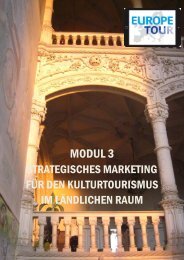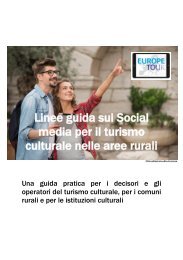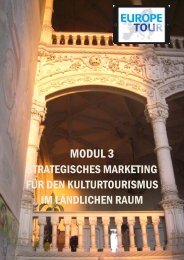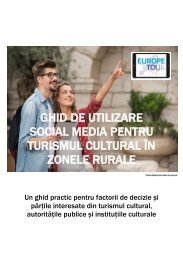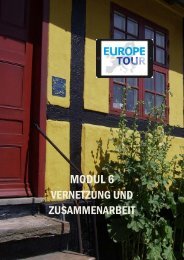M5_Communication_Strategy_v6
You also want an ePaper? Increase the reach of your titles
YUMPU automatically turns print PDFs into web optimized ePapers that Google loves.
CULTURAL TOURISM TRAINING COURSE<br />
MODULE 5 - COMMUNICATION STRATEGY<br />
Digital communication<br />
Last but not least, it is important to “translate” your cultural tourism offers, experiences, and products,<br />
into good storytelling for the digital media age.<br />
If you run a website, consider adding a blog posting regularly (i.e., at least once or twice a month) in<br />
the form of short articles, news, images or videos about your business, your offers, or events. This will<br />
require both financial and above all, personnel resources, since it needs to be moderated and maintained.<br />
However, on the plus side, Social Media communication provides a perfect opportunity for your<br />
clients, and business partners, to get in touch with you and ask questions directly.<br />
Social Media can come in various forms. There are forums, blogs, Wikis, Social networks, online rating<br />
websites such as TripAdvisor, HolidayCheck, or platforms such as AirBnB even, increasingly promoting<br />
“experiential travel” by hosting (and selling) cultural experiences (i.e. cooking courses, guided tours,<br />
etc.).<br />
Digital communication, by its dynamic nature, can be considered “real-time marketing”.<br />
A series of techniques are involved. Consider applying the following to your business when thinking of<br />
digital communication strategies and Social Media :<br />
Start by choosing the right Social Media channel for your audiences (video – YouTube,<br />
photography – Instagram, community building & events – Facebook, etc.)<br />
Publish regularly to your audiences, tagging other related pages and accounts in your niche /<br />
network / geographical area, “speak” to your clients and answer questions in the comments<br />
field of various Social Media channels<br />
Aggregate the right content to your page, instead of always promoting your own content<br />
Share and (re)share existing (static) information, it may need more than one time to be viewed<br />
and / or be picked up by your target audiences<br />
Act as a platform for knowledge exchange, discussion, information, and advice.<br />
Run competitions, prize draws, or advertising on Social Media as a ways to reach even more<br />
clients and “followers” in your networks<br />
Social Media<br />
Contrary to advertising, Social Media is not a direct sales channel. Rather, it serves to build (longlasting)<br />
relationships with your customers, and allows you to promote a “public (human) face” of your<br />
business, organization, municipality, or institution.<br />
The goals using digital communication technologies are:<br />
Increase brand awareness<br />
37



